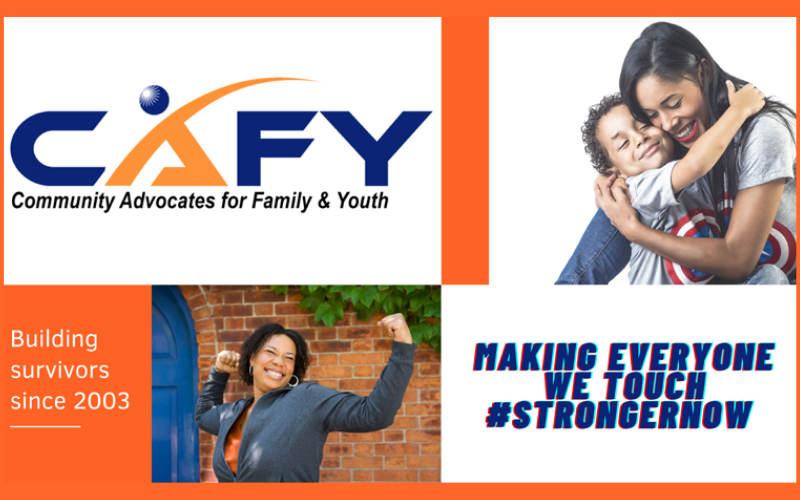CAFY (Community Advocates for Family & Youth) embraces, educates, and empowers more than 3000 victims of crime and their families annually in Prince George’s County by providing trauma-informed case management, counseling, housing and job readiness assistance, and other supports. CAFY’s housing services, which are primarily provided to survivors of domestic violence, include emergency housing, support in finding permanent housing, and financial assistance for essential expenses, like lock changes, security deposits, utility bills, and safety phones.
In 2021, CAFY received a Partner Grant from Many Hands to provide emergency and permanent housing for its Begin Again and Thrive program participants, many of whom have experienced domestic violence. Many Hands Board member Robin Berkley had the pleasure of touching base with the organization’s founder and CEO, Arleen Joell. Here’s what she had to say:
How did the Many Hands grant help CAFY fulfill its mission of empowering victims of crime and their families to begin their journey of healing? The Many Hands grant allowed us to immediately scale up our delivery of housing stability for women and their children looking to restore their lives following homelessness and domestic violence. CAFY used Partner Grant funds to offer the Begin Again and Thrive Program, which provides housing assistance and wrap-around services. These coordinated programs place survivors in both emergency and permanent housing. CAFY also used the grant to provide financial literacy education, assistance securing permanent housing, support for mental health services, legal assistance, and three to four months of survivor assistance with a follow-up appointment at 12 months to identify and mitigate roadblocks early and avert potential homelessness and additional instability. To date, CAFY has supported seven women and their children in the program. Of those, three families are attending our Strengthening Family Program, which is a twelve-week program to establish new boundaries, relationships, and rules within the new violence-free household.
Why did you decide to start CAFY and support victims of crime in Prince George’s County? After early retirement from IBM, I was able to tap into my original passion of helping children. With a Bachelor’s in Criminal Justice from University of Pittsburgh that I hadn’t put to use, I started with volunteering at the local sexual assault center. In 2005, I created the “Kiddie Court Program” for children who had to testify in court, helping to make sure they could speak with a credible voice in the adult judicial system. After three years, I expanded our reach to early victim service intervention to better address the trauma children experienced before they were given a chance to use their voice in court. Over time, I continued to identify gaps in services and sought opportunities to support more children and their parents to restart, stabilize, and restore their lives. Restoration requires stabilization, which requires housing that is affordable, accessible, and achievable. Using my gift of servanthood that was instilled in me early as a child, I have been able to create partnerships and collaborations that have had a lasting impact on women and children.
How has the COVID pandemic changed the needs of CAFY clients? How has CAFY pivoted to continue its work to support victims and their families during the pandemic? During the pandemic, CAFY experienced an 18% increase in referrals of clients. While CAFY received COVID relief funds for computers, printers, and other equipment to allow for telework, many of our clients lacked access to reliable Internet service, leading our team to pivot to a lot of phone work and snail mail in order to ensure we reached those impacted by violence. Many of our clients were not eligible for the stimulus or unemployment, so in addition to trying to stay safe in a violent home, they were seeking assistance for food and transportation. If anything, the pandemic heightened the importance of our work, so CAFY has continued to promote our ability to serve those in need through social media, bus stop ads, and mailings to reach as many survivors as possible.
What makes the Many Hands grant process a unique opportunity for an organization like CAFY? The ability to have a larger impact on women and children is significant. We believe that long-term support and additional safety days create more sustainable outcomes for survivors. We are in the process of collecting the data to demonstrate the impact of these additional services.
We also connected with another organization going through the Many Hands process and now share information about our work in the county. In addition, we attracted two additional funders who saw we were funded by Many Hands and were interested in learning more about CAFY.


